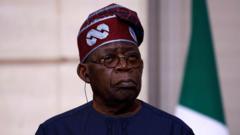In Nigeria, a vibrant country home to over 250 ethnic groups, the political landscape has always demanded a delicate balance when it comes to appointments based on ethnic and religious lines. This balance has served to foster national unity in a nation with a history of division. However, recent appointments by President Bola Tinubu are stirring significant concern, suggesting that this careful equilibrium may be in jeopardy.
While the Nigerian constitution mandates regional representation in cabinet positions, there has been an unwritten expectation that other significant roles are distributed to promote national harmony. Critics contend that Tinubu, who has been in office for two years, has shown a preference for selecting individuals from his own Yoruba ethnic group, a claim that the presidency vehemently denies.
The anxiety that one ethnic group might dominate leadership roles has long been a sensitive issue. The major ethnic groups in Nigeria—Hausa-Fulanis, Igbo, and Yoruba—have historically made up the most important facets of governance. Since Tinubu's ascension to the presidency, many have scrutinized his appointments, with the most notable point of contention being his decision to select a northern Muslim as his running mate, breaking a long-held tradition of forming mixed Muslim-Christian tickets.
As of April 2023, all eight crucial leadership positions under Tinubu—responsible for the nation's critical financial and security apparatus—were filled by members of the Yoruba ethnic group. Critics have pointed to recent appointments, like Bayo Ojulari as head of the Nigerian National Petroleum Company, as emblematic of this trend, arguing it highlights an unprecedented Yoruba dominance.
Comparatively, recent predecessors, such as Goodluck Jonathan and Muhammadu Buhari, presented more ethnically diverse teams by this time in their presidencies. For instance, Jonathan's administration included representatives from multiple ethnic backgrounds, while Buhari's drew heavy criticism for favoring northern representation despite presenting a mixed bag.
Historically, the fear is that as presidents continue this trend of favoritism towards their ethnic group, it may weaken feelings of inclusion among other groups and diminish faith in democracy itself. Notably, northerners have voiced alarm at the concentration of power amongst the Yoruba, particularly following the controversial replacement of Abdulrasheed Bawa, a Hausa, by Ola Olukoyode, a Yoruba, as head of the Economic and Financial Crimes Commission.
Tinubu's spokesperson claims the president’s appointments reflect a broader vision of inclusivity; however, the details have sparked debate and confusion, leading to accusations of inaccuracies in official statements. Even within his political party, doubts have emerged regarding the inclusiveness of Tinubu's selections.
While some political analysts believe the president should prioritize competence over ethnic background, the uneasy climate remains, suggesting the need for change in Nigeria’s political culture towards a more equitable representation of its diverse mosaic of ethnic groups. According to historian Tijjani Naniya, a resolution may only come when future leaders demonstrate commitment to inclusivity in both governance and projects, fostering a renewed sense of unity among Nigerians.
While the Nigerian constitution mandates regional representation in cabinet positions, there has been an unwritten expectation that other significant roles are distributed to promote national harmony. Critics contend that Tinubu, who has been in office for two years, has shown a preference for selecting individuals from his own Yoruba ethnic group, a claim that the presidency vehemently denies.
The anxiety that one ethnic group might dominate leadership roles has long been a sensitive issue. The major ethnic groups in Nigeria—Hausa-Fulanis, Igbo, and Yoruba—have historically made up the most important facets of governance. Since Tinubu's ascension to the presidency, many have scrutinized his appointments, with the most notable point of contention being his decision to select a northern Muslim as his running mate, breaking a long-held tradition of forming mixed Muslim-Christian tickets.
As of April 2023, all eight crucial leadership positions under Tinubu—responsible for the nation's critical financial and security apparatus—were filled by members of the Yoruba ethnic group. Critics have pointed to recent appointments, like Bayo Ojulari as head of the Nigerian National Petroleum Company, as emblematic of this trend, arguing it highlights an unprecedented Yoruba dominance.
Comparatively, recent predecessors, such as Goodluck Jonathan and Muhammadu Buhari, presented more ethnically diverse teams by this time in their presidencies. For instance, Jonathan's administration included representatives from multiple ethnic backgrounds, while Buhari's drew heavy criticism for favoring northern representation despite presenting a mixed bag.
Historically, the fear is that as presidents continue this trend of favoritism towards their ethnic group, it may weaken feelings of inclusion among other groups and diminish faith in democracy itself. Notably, northerners have voiced alarm at the concentration of power amongst the Yoruba, particularly following the controversial replacement of Abdulrasheed Bawa, a Hausa, by Ola Olukoyode, a Yoruba, as head of the Economic and Financial Crimes Commission.
Tinubu's spokesperson claims the president’s appointments reflect a broader vision of inclusivity; however, the details have sparked debate and confusion, leading to accusations of inaccuracies in official statements. Even within his political party, doubts have emerged regarding the inclusiveness of Tinubu's selections.
While some political analysts believe the president should prioritize competence over ethnic background, the uneasy climate remains, suggesting the need for change in Nigeria’s political culture towards a more equitable representation of its diverse mosaic of ethnic groups. According to historian Tijjani Naniya, a resolution may only come when future leaders demonstrate commitment to inclusivity in both governance and projects, fostering a renewed sense of unity among Nigerians.



















